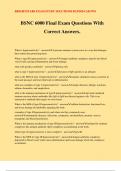Exam (elaborations)
BSNC 6000 Final Exam Questions With Correct Answers.
- Course
- Institution
BSNC 6000 Final Exam Questions With Correct Answers. What is hypersensitivity? - answerA persons immune system reacts in a way that damages them rather than protecting them What is type III hypersensitivity? - answerAntigen-antibody complexes deposit into blood vessel walls causing inflammatio...
[Show more]



